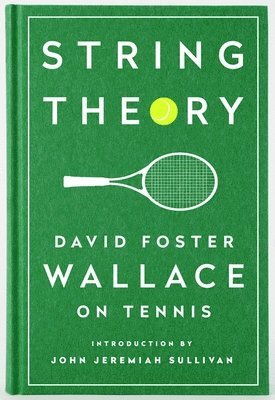
- Format
- Inbunden (Hardback)
- Språk
- Engelska
- Antal sidor
- 158
- Utgivningsdatum
- 2016-05-10
- Förlag
- The Library of America
- Medarbetare
- Sullivan, John Jeremiah
- Illustrationer
- illustrations
- Dimensioner
- 224 x 142 x 15 mm
- Vikt
- Antal komponenter
- 1
- Komponenter
- ,
- ISBN
- 9781598534801
- 318 g
String Theory: David Foster Wallace On Tennis
A Library of America Special Publication
- Skickas från oss inom 5-8 vardagar.
- Fri frakt över 249 kr för privatkunder i Sverige.
Passar bra ihop
De som köpt den här boken har ofta också köpt The 48 Laws of Power av Robert Greene (häftad).
Köp båda 2 för 519 krKundrecensioner
Fler böcker av David Foster Wallace
-
Infinite Jest
David Foster Wallace
-
A Supposedly Fun Thing I'll Never Do Again
David Foster Wallace
-
This Is Water
David Foster Wallace
-
Texter
David Foster Wallace
Recensioner i media
"This book has nothing to do with physics, but its title will make you look super smart if you're reading it on a train or plane. String Theory is a collection of five of Wallace's best essays on tennis, a sport I gave up in my Microsoft days and am once again pursuing with a passion. You don't have to play or even watch tennis to love this book. The late author wielded a pen as skillfully as Roger Federer wields a tennis racket. Here, as in his other brilliant works, Wallace found mind-blowing ways of bending language like a metal spoon." -Bill Gates, "My Favorite Books of 2016" "David Foster Wallace's Federer essay turned me into an avid tennis fan." --Lin-Manuel Miranda, The New York Times Book Review"A wonderful and inspiring collection for fans of either tennis or eye-popping prose." --Austin American-Statesman "String Theory expertly articulates why tennis fans love the sport so, capturing both the human drudgery behind its mastery and, for those who make it to the world-class level, its otherworldliness...[It] stands as a monument to Wallace's talent--and his dedication to the game."--Doug Perry, The Oregonian/The Spin of the Ball "This collection is a tennis classic that deserves shelf space next to John McPhee's Levels of the Game and Brad Gilbert's Winning Ugly...Between its grass-green covers, five of Wallace's erudite and engaging tennis essays are collected and, together with a pitch-perfect introduction by John Jeremiah Sullivan, the result is nothing short of delightful, like a ball streaking off a racquet's sweet spot for a winner...David Foster Wallace is a great talent, writing on a subject he knows and loves. And that make this little book, quite simply, an ace."--Jeff Simon, The Buffalo News"David Foster Wallace's essays on tennis are a treasure, some of the best writing ever on the sport, and they are all here in the Library of America's this deluxe hardcover collector's edition."--NY Sports Day "Ruminative, digressive, lyrical, funny, sad, sometimes borderline lunatic, these posthumously collected journalistic pieces have all the hallmarks of Wallace's novels."--The Washington Post"Wallace's essays on tennis, collected here in a remarkable volume, are a mixture of courtside reportage and armchair rumination. How, he asks, are those who play tennis at the highest level able to do what they do? What is their genius? When we watch, what are we missing? The tennis-obsessive will find Wallace's considerations almost bewilderingly insightful."-- The Telegraph (UK) "Wallace's grasp of tennis was truly prodigious. The analytical powers that must have ended up hindering him as a player made him a peerless observer of the sport. He has often been described as the best tennis writer of all time, and these essays don't disabuse that notion."-- The Guardian (UK) "What makes this collection so valuable for serious tennis fans is the chance to see 'the most beautiful sport there is' through Wallace's eyes. In a nation that often derides tennis as effete because it lacks physical contact, Wallace sees it as manly; 'It is to artillery and airstrikes what football is to infantry and attrition.' Deep down I always knew tennis was a war game. To get wrapped up in this collection is to get pulled deep into the mind of Wallace and, once there, of course, his inescapable subject. 'Midwest junior tennis was also my initiation into true adult sadness, ' he wrote. In his early teens Wallace became one of the better tournament players in the Midwest by combining his understanding of geometry with a Zen attitude about the horribly annoying regional winds and a defensive style that focused on not missing shots, thus making other kids go mad."--Toure, Town & Country
Övrig information
David Foster Wallace (1962-2008) was born in Ithaca, New York, in 1962 and raised in Champaign-Urbana, Illinois, where in his teens he was a regionally ranked junior tennis player. His works include Infinite Jest, Girl with Curious Hair, Brief Interviews with Hideous Men, Oblivion, A Supposedly Fun Thing I'll Never Do Again, and Consider the Lobster. His final novel, The Pale King, was posthumously published in 2011. John Jeremiah Sullivan is one of America's leading practitioners of the long-form magazine profile, with work appearing in The New York Times Magazine (where he is a staff writer), Harper's (of which he is a contributing editor), The New Yorker, New York, Oxford American, GQ, and other magazines. He is the author of Blood Horses: Notes of Sportswriter's Son and Pulphead.
Du kanske gillar
-
Knife
Salman Rushdie
InbundenFrågor & svarTroubled
Rob Henderson
Inbunden


